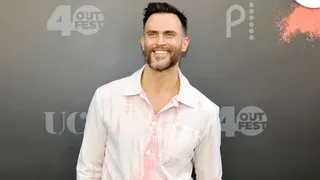December 20, 2015
Fraught Trans Process Exposed
Jason Hanasik READ TIME: 17 MIN.
Sweat is pooling beneath Eliot Daughtry's freshly-pressed white shirt, cerulean tie and khaki vest as he walks up and down Franklin Street in Oakland. It's 86 degrees and his jeans are beginning to stick. As the shutter from a camera releases, his furrowed brow softens and he grins. Click.
Daughtry, an Oakland resident, was in the middle of a photo shoot with Kaiser Permanente last summer. He volunteered for the gig helping the health plan's Regional Health Education Department create materials for transgender patients and their families who need information about hormones, surgery, and more.
"It's something positive I can do that is community-focused. I want people to see and understand the diversity of the transgender community," he said. "Since I'm not closeted, I have a little more flexibility."
What the images don't show is that while Daughtry was a member of Oakland-based Kaiser Permanente from 2009 to 2014, his request for a hysterectomy - surgical removal of the uterus and ovaries - was denied as medically unnecessary.
Daughtry's denials for his hysterectomy came in many forms. While a patient with Kaiser, Daughtry said his denials were delivered to him verbally by his doctor. (Kaiser declined to comment on Daughtry's claim of denial.)
When he switched to Aetna for his insurance and again requested a hysterectomy, Daughtry received two written denials. In an email to Daughtry on July 8, Aetna representatives wrote, "This coverage denial was based on the terms of the member's benefit plan document. The plan has a specific exclusion for the requested service or treatment."
Although Daughtry finally got his operation this fall after a long quest, transsexuals nationwide continue to be denied services based on their gender identity. Their stories appear throughout various social media channels and are often organized using the hashtag #TransHealthFail.
In 2014, the Williams Institute - a think tank at UCLA School of Law focused on conducting independent research on sexual orientation and gender identity law and public policy - reported in its study "Suicide Attempts Among Transgender and Gender Non-Confirming Adults" that transsexual people who had "reported having negative experiences related to obtaining medical care as a transgender or gender non-conforming person also reported an elevated prevalence of lifetime suicide attempts."
But this year in Washington, D.C., a change began.
On September 3, the U.S. Department of Health and Human Services began a 60-day public comment period on a proposed rule called "Nondiscrimination in Health Programs and Activities." If implemented, the Affordable Care Act's ban on discrimination based on race, color, national origin, disability, or age would be amended to include gender identity. The new rule would end the categorical exemptions some individuals have faced when seeking gender transition care. In cases like Daughtry's, it would be unlawful for most insurers to deny a hysterectomy based on gender identity.
The ban would extend to insurers participating in the health insurance marketplace, any health program that HHS administers, and any agencies or caregivers receiving any funding from HHS, the department said in a release. This includes hospitals that accept Medicare patients and doctors who treat them.
"The proposed HHS rule is an enormous milestone for all transgender and gender non-conforming people in the U.S. Access to safe, respectful health care is a basic human right, and this policy makes a huge advance towards equity in health care for transgender people," Kris Hayashi, executive director of Oakland-based Transgender Law Center, said in a news release.
Internal Struggle
The 49-year-old Daughtry's 5 foot 3 inch height is accented by a bright blue mohawk and goatee that shimmer in the sunlight. Born in North Carolina and raised in Virginia, Daughtry lost his Southern drawl but still exudes the manner of a Virginia gentleman.
"I'm definitely masculine but not particularly butch," Daughtry said, winking. He wasn't always so comfortable in his skin.
Daughtry said he experienced the first of many panic attacks during the fall semester of his senior year of high school. While the trigger was then viewed as an assignment for his economics class, Daughtry said he now believes it was one of the first symptoms of his internal struggle about his gender identity. He sought psychological services.
"My therapist, after noting my clothing at a session, suggested that I might want to check out the chapter 'In America They Call us Dykes' in her copy of Our Bodies, Our Selves. My stepmother had a copy that I read on the next visit," Daughtry recalled.
At age 18, Daughtry announced to his parents that he identified as queer.
"I knew I was different, and that my sexual interests were not in line with 'normal' people," he said. "I felt like an alien, and was so uncomfortable in my body that I didn't really live in it. At times I suspected that I would be happier if I was a computer, and often revisited the 'robot' identity that I used to separate myself from my body to favor my brain."
Daughtry made a conscious decision not to mention his gender identity or sexual orientation prior to his 18th birthday because he feared repercussions, such as being institutionalized, which is a choice parents can make on behalf of their children while they are still minors.
In 1987, Daughtry moved to the Midwest to study at the School of the Art Institute of Chicago. At school he was introduced to the work of the philosopher Judith Butler and the writer Joan Nestle and their respective works on gender and performance. The ideas presented in their texts resonated with him, but were also troublesome when he tried to understand them in light of his individual gender identity.
"The worst times dealing with myself as 'feminine' came when either partners or parents insisted that I dress in women's clothes. Family visits that involved 'dressing up' were always excruciating, but it turned into an experience of terror in conformity. Wearing a dress became physically and mentally agonizing, and even 'softening' my appearance for other people's comfort was traumatizing. The kicker was always getting complimented for how lovely I looked, while the mirror told me I looked like a really uncomfortable and bad drag queen," Daughtry recalled.
After graduating from the School of the Art Institute with his bachelor's degree, Daughtry began working at a series of nonprofits, creating performance work for the local art scene, helping with AIDS fundraisers, and participating in the local leather community, which he said provided him a safe space to explore roles and gender play.
"It was the only place I found that I could freely experiment," Daughtry recalled, "one where I could try to figure out what was going on and what I wanted to do about it."
Alienated and Alone
While trying to establish himself as an artist in his mid-20s, Daughtry said he felt profoundly alienated and alone as he thought more and more about transitioning.
"I hit the point where I wasn't able to think about anything but it," Daughtry said. He said he started to research what he needed to do to begin the transition process, realizing that, "This isn't a game. I'm not stuck in a scene and this is not some childhood trauma."
In November 1992, living paycheck-to-paycheck and possessing poor credit, Daughtry went to the Howard Brown Health Center in Chicago in search of help. The center is one of the nation's largest health care and research organizations, primarily serving the LGBT community and its allies. Benefiting from a sliding scale payment model, Daughtry began working with a counselor.
"We started working on the severe anxiety I was experiencing," Daughtry said. "When you don't know anybody who is transgender and everything you can find tells you that you're pathological, it's a little hard to be confident in yourself."
At first, it wasn't clear to Daughtry that hormones or surgery were even an option.
The pressing desire was not to have breasts, a dream he said he'd had since he was 12 years old.
"The chest was a problem, because there was no way for me to pass as male with a 34C cup size," Daughtry said. "To this day, even if I couldn't have accessed hormones, I would have found a way to have my breasts removed."
To hide his breasts, Daughtry began binding his chest. First, he started with jog bras worn as tightly as possible. After five years of binding his chest with bras, Daughtry's friend made him a custom latex chest binder. While the binder was more comfortable, it made him sweat and exacerbated the acne fueled by testosterone. Much worse long-term effects of modifying his body continue today.
Daughtry attends physical therapy sessions now in an attempt to undo the long-term effects of binding - including dislocated ribs.
"My terror at appearing female forced me to wear an Ace bandage a lot longer than I should have," he said.
Having his breasts removed was about shedding an uncomfortable cultural signifier of femininity, he said. By contrast, he explained, his long-sought hysterectomy was a medical necessity.
"The hysterectomy was about managing my long-term health, comfort, and hormone usage. My menses ceased shortly after I started on testosterone, but I continued to have reproductive system issues if I missed a shot," Daughtry said. "Even on testosterone, I would experience cramping on occasion. Of all the things that can trigger dysphoria for me, this is possibly the worst - having to deal with a constant reminder of biology that for me is an appendage at best, and maybe should be looked at like having appendicitis."
When Daughtry began seeking psychological services, he was making $360 a week. He would save $5 to $40 per paycheck for the expensive surgeries he knew were forthcoming, using his sock drawer as his savings account. "When there were enough $20 bills to warrant, I would take them to the bank and trade them for $100 bills," Daughtry recalled.
Diagnosis, Treatment
In September 1994, Daughtry was diagnosed with gender dysphoria from Pathways Counseling Center in Milwaukee, Wisconsin. The language for this diagnosis has vacillated through the years. For a short time, the diagnosis was updated to gender identity disorder before it was switched back to gender dysphoria. In the American Psychiatric Association's manual, gender dysphoria is defined in part as "clinically significant distress" due to "the difference between the individual's expressed/experienced gender and the gender others would assign him or her."
"Dysphoria gives me a name to describe the incredibly difficult relationship I have to my own physical being, and navigating when my gender and biology don't match," Daughtry said.
One month after his diagnosis, Daughtry began testosterone therapy on October 10, 1994, his 28th birthday.
On June 24, 1997, with a fistful of $100 bills, Daughtry paid $6,000 for his double mastectomy - but not before several male surgeons asked why he would want to change "such a beautiful female body."
Over the next 10 years, he changed his legal name. His birth certificate was reissued by the state of North Carolina with an updated gender marker and he moved to San Francisco with Kriss De Jong, whom he wed in a legal marriage ceremony in New York City in 2005.
In San Francisco, consumed with his day job, Daughtry stopped pursuing transition-related procedures and focused on building his new life.
"I went through different stages with comfort and discomfort with my body and how people perceived me," Daughtry said. "After being in therapy for so long, I would sometimes think, 'I've done all my paperwork. Maybe I'm done.'"
Right as the first dot-com bubble burst in the San Francisco technology sector, Daughtry switched health insurance providers and joined Health Net.
In 2007, when his cholesterol levels became elevated and he started to experience extreme pelvic pain, his gynecologist, Dr. Marilyn Milkman, suggested that he get a hysterectomy. (Daughtry agreed to let Milkman speak about his medical issues.)
"The bad side of testosterone is what it does to your lipids. It's why men have an earlier incidence of heart disease than women. Our estrogen protects us. Daughtry has needed to use a much higher amount of testosterone because he's trying to override normally-functionally ovaries. One of the benefits we're going to see from him having his ovaries taken out should be a lower dosage of testosterone," Milkman said.
Health Net denied the request. In an email, Brad Kieffer, of Health Net, said that Daughtry's 2007 policy - which was, at the time, approved by regulators - "specifically excluded treatments related to sex transformations."
While Milkman requested the hysterectomy for pelvic pain, "as soon as they knew he was transgender, they didn't care about the pelvic pain issue," she said.
Switch to Kaiser
Spurred by the rising cost of his health insurance plan and the denied hysterectomy, Daughtry switched to Kaiser in 2009. The Oakland-based integrated managed care consortium offers both health insurance and health care to its members.
"Kaiser was local and had a decent reputation with lesbian, gay, bisexual, transgender health," Daughtry said.
After researching available general practitioners, Daughtry chose someone believed to be transgender-friendly and was disappointed when the physician discouraged the procedure.
"I didn't expect my doctor to say, 'You don't need to worry about that. That's not a big deal,'" Daughtry said.
But Daughtry depicts his ongoing fear and unease with female organs in graphic, nightmarish terms.
"Sometimes the uterus and ovaries gave me nightmares straight out of the chest-bursting Aliens movies. As I got older, there was a constant worry level about what was going on. Would my organs become cancerous? Would I end up with advanced cancer like Robert in Southern Comfort?" Daughtry said, referring to the HBO documentary about a trans man who was repeatedly denied health care.
Kaiser Permanente declined to comment on Daughtry's medical history, stating in an email, "Out of respect for patient privacy laws and our members' confidentiality, we cannot discuss an individual's medical care with the media."
Personal Setback
Amid mounting medical bills, interest on debt, and the economic downturn, Daughtry and his partner declared bankruptcy in 2010.
Daughtry didn't seek any follow-up care again until August 2014, although he remained a Kaiser patient. Due to his history with doctors and the stress of medical visits, he said he rarely sees a doctor even when his medical concerns are not related to his transition.
Meanwhile, he went to work as a part-time instructor at Expression College, a for-profit college in Emeryville. Focused on teaching game art and stabilizing his finances, Daughtry stopped requesting a hysterectomy from Kaiser.
"How do you stay on top of this and live your freaking life?" he said.
But after being promoted to full-time instructor at Expression in December 2014, Daughtry obtained health insurance through the college. Given the option of Kaiser or Aetna Healthcare, he chose Aetna so that he could return to his former gynecologist, Milkman, believing she would fight for the procedure he needed.
Daughtry met with his gynecologist last June and they started the process of scheduling his surgery. Not wanting to be denied a third time by a third insurer, Daughtry said he called Aetna asking what the process for coverage entailed. He was told that he needed to have the surgery pre-certified.
When Milkman applied for the pre-certification using Daughtry's pelvic pain as the reason for issuing the request, the request was verbally denied on the grounds that the gender marker was incorrect, according to Milkman.
"My doctor's office was told by Aetna that a hysterectomy can only be done on someone who is female," Daughtry said.
"Eliot has had the hardest time getting permission to have his surgery," Milkman said. "You'd think it would be easier now. For all intents and purposes, Eliot transitioned a long time ago, except for this."
In an email response, Anjie Coplin, Aetna's director of communication for its western region said the request was rejected at the time because "The clinical data we had at the time of the request did not fulfill the clinical criteria. Meaning, that the medical necessity (MN) criteria needed to approve a hysterectomy [had] not been met since documentation had not, at the time, been submitted to support MN."
The denial was appealed and instead of citing pelvic pain, the second time Daughtry's doctor submitted the procedure codes used for transgender patients, according to Daughtry.
After receiving the denial, suddenly, Daughtry started experiencing a reoccurrence of anxiety attacks and repeating nightmares. On July 22, Daughtry sought psychological services for his anxiety, panic attacks, and recurrent memories about blocked medical access. On August 12, he was diagnosed with post-traumatic stress disorder by his therapist.
"I cried when [my therapist] told me that the repeating memories and many other things I'd been experiencing were related to PTSD. It wasn't just anxiety and panic," said Daughtry.
(Daughtry asked to keep the identity of his therapist private. This reporter contacted the therapist and has confirmed the diagnosis.)
On the following day, he was granted short-term disability by the Employment Development Department of California.
On July 8, Aetna denied Daughtry's second request for a hysterectomy. During a follow up email to Daughtry on July 28, Aetna representative Diana Garcia wrote that medical plan exclusions included "Sex change: Any treatment, drug, service or supply related to changing sex or sexual characteristics, including surgical procedures to alter the appearance or function of the body; hormones and hormone therapy; prosthetic devices; and medical or psychological counseling."
Hearing the news, Daughtry's gynecologist said she was dejected.
"We're living in a part of the world where this should have been a piece of cake. ... This should have been immediately approved without a hassle because supposedly we're the most enlightened about it here," Milkman said.
Milkman thought that getting approval would be easier this time around. She had recently received pre-approval authorization for a hysterectomy for a different trans male patient.
"I would love to be in a world where we can practice good medicine and not worry about whether a shareholder in Aetna is making money on this transaction. It should be about doing the right thing for somebody," Milkman said.
At this point, Daughtry's life was almost entirely focused on managing his PTSD, his pelvic pain, therapy to reverse the long-term chest binding, and communicating with the administrative layers of Aetna.
"I constantly feel embattled, having to fight to have other people give you a modicum of respect, treating you with actual dignity," he said, "and not saying to your face that you are an awful, subhuman thing."
Experiences Echoed Daily
Daughtry's experiences are not idiosyncratic. His experiences are echoed daily on Twitter by others in transition or living as trans men and trans women. The experiences are organized using the hashtag #transhealthfail.
For example, on November 11, Olivia Kessler, of Pittsburgh, Pennsylvania, posted on Twitter, "I'm constantly battling doctors, insurance companies, and pharmacies just to get my hormones. I finally found a good method, now I can't get it."
Kessler, 28, began transitioning a year ago, a few months after coming out to her friends and college colleagues, and said in a series of direct messages on Twitter that she started college when she was 24, but had to drop out when her parents kicked her out of her house after learning that she was trans and beginning hormone therapy.
The public comment period on HHS' proposal closed November 9. During the 60-day public comment period, 2,115 comments were registered on the website. Stories like Kessler's and Daughtry's consistently appear as narratives supporting the adoption of the proposed ban of biased care.
"I run a suicide hotline for transgender people," posted Greta Gustava Martela. "We've talked to 6,600 trans people in crisis in 2015. Access to health care is one of the number one issues we hear about on our crisis line. Gender affirming health care can help transgender people better integrate into society. Providing trans healthcare will save many lives."
Martela, a trans woman, is the co-founder and executive director of Trans Lifeline. Launched in November 2014, the hotline is staffed by transgender volunteers and caters to transgender people.
"We don't have data specific to medical access," Martela said in an email, but added, "we have many calls related to dysphoria, which is the feeling of incongruence between one's internal sense of self and your external appearance. Access to medically necessary transition care as defined in the WPATH - World Professional Association for Transgender Health - is the best thing we have to combat this."
Martela said decisions about medical care shouldn't be left to insurance companies.
"Allowing insurance companies to decide what is and isn't medically necessary is something we don't allow for any other segment of the population," she said. "Current restrictions on transgender medical care are nothing more than institutionalized bigotry in the name of profit. The sad irony of this is that giving trans people the proper care would actually be cheaper in the long run."
While most public comments supported the proposed rule, a minority voiced concerns.
"If a person decides that this is something that they must do, in spite of biological reality, then they should pay for it out of their own pocket, as would a person seeking cosmetic elective surgery, or perhaps at the expense of their activist support network," posted a person giving the name Matthew Kijewski. Most negative comments were submitted without a name attached to their sentiments.
When asked about Kijewski's post, Daughtry said, "His view doesn't appear to recognize that trans men exist - after all, a hysterectomy serves no cosmetic purpose. It addresses a particular health care issue." He continued, "If a person is born with a cleft palate, nobody would argue that it should be left alone because it is cosmetic."
Change in Fortune
On September 15, 2015, for the first time in two decades, Daughtry's fortunes changed. A week after Aetna's denial, when this reporter emailed for comment, Coplin replied that the insurer's executive response team would look into his concern.
Eight days later, Milkman received a phone call. "I am a physician with Aetna. I'm calling from Colorado. I'm a peer-to-peer reviewer. I want you to know that I support this notion," Milkman recalled the caller saying.
The following morning, sporting a "Love Conquers Hate" T-shirt, Daughtry was driving to his therapist's office when he pulled off the highway to return a voice message from Aetna. His surgery had been approved.
"After our executive response team reviewed the case, they reached out to Eliot's physician to obtain more clinical information, which we originally did not have," Aetna explained in an email to this reporter on September 24. "Based on the clinical information [that] was shared, we made the determination to cover the hysterectomy. We are happy that we were able to resolve this issue for Eliot."
Daughtry couldn't believe the news.
"Wow, [this is] kind of surreal," Daughtry said. "The Aetna rep was incredibly apologetic. It was a very different conversation than I have had with Aetna. She made no excuses."
"When Aetna reversed the decision on the second appeal and I went in to re-do the pre-surgical meeting with Dr. Milkman, I still didn't believe surgery was going to actually happen until I was literally being equipped with the IV ports and being sedated," Daughtry recalled.
Daughtry's case may stand as one ripple in a wave of policy shifts and approvals that may be expected to occur, should HHS implement their proposed rule.
Since Daughtry left Health Net, the company policy has evolved and "no longer excludes procedures and treatments for those with gender dysphoria," said Health Net's Kieffer, who said that its current medical indications for benefits policy is based on guidelines set forth by WPATH.
Kaiser, too, said it has expanded its services for trans clients.
"Like many fields in medicine, transgender care is evolving rapidly. Kaiser Permanente has an expert group of physicians and other leaders who are actively engaged with the medical community to develop evidence-based guidelines, and also with our patients to incorporate their voices and directly address their needs," wrote Barbara Crawford, vice president for quality and regulatory services, Kaiser Permanente Northern California, in an email response. "For surgical evaluation we follow widely accepted international guidelines which involves multi-disciplinary evaluations by mental health experts and a team of medical professionals and surgeons."
Now that the public comment period has closed, HHS will weigh the comments as it drafts its final rule, banning discrimination on grounds of gender in the provision of medical services.
Surgery
Daughtry's hysterectomy was completed October 7. His gynecologist, Milkman, confirmed, after surgery, that the ovaries removed had still been secreting estrogen. The female hormone had required her patient to take higher doses of testosterone, which he now can dial back.
But six weeks after his hysterectomy was performed, Daughtry was notified by Milkman's office that Aetna had reversed its decision and was not honoring its pre-authorization. Daughtry's anxiety levels increased: While he was happy to have had the surgery, he dreaded the unplanned medical bills.
Daughtry sat in limbo for over a week.
Aetna contacted Daughtry November 24 and informed him that the claim had been incorrectly processed due to his gender marker and that the surgery would indeed be covered.
In an email comment, Aetna's Coplin, said, "The original claim was denied by our claims processors due to them incorrectly thinking the claim was billed in error for a hysterectomy for a male. It appears the processor did not check the notes in the file that [the] claim was to be approved. The issue was resolved as soon as it was brought to their attention and we are working with the processors to make sure that this doesn't happen again."
Daughtry is still recovering from his surgery and said he feels like he has now re-entered adolescence.
"I joke about puberty 3.0, but it isn't much of a joke," he said. "Acne, hair growth, sex drive. At 49, it is equally amusing and horrifying to be challenged like a 14-year-old on bodily changes. At least this time around, I knew a little about what I might experience."
This story is being co-published with Oakland North, an online news site that is a project of the Graduate School of Journalism at UC Berkeley







